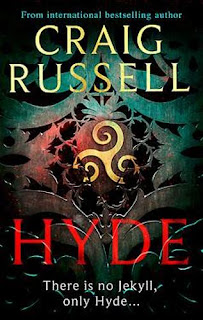Hyde – Craig Russell
Well in some ways, Hyde is a companion piece or expansion of how Russell treated similar themes in his last book The Devil Aspect. That rip-roaring Gothic adventure managed to blend vampire mythology with East European folklore and hints of the dark side of Nazism in its 1935 setting. The “devil aspect” theory suggested that the potential for madness lies in all of us and with the right trigger applied, those most susceptible can be pushed towards acts of great evil. Hyde seems the obvious way to explore this issue further, but you can expect that Russell will similarly bring a new and thrilling twist to the classic story.
What is immediately noticeable about the story is how Russell brings it back to the Scottish origins of Jekyll and Hyde’s creator, Robert Louis Stevenson. Setting Hyde in Edinburgh, he retains the feel of the late Victorian period for maximum Gothic character, as well evidently for the theme of the social hypocrisy of respectable citizens having secret lives of sin and depravity. Edinburgh also proves suitable as the centre of medical innovation and advances in scientific thought at this time, and indeed the real-life Dr Joseph Bell, the inspiration behind Sherlock Holmes, even makes a brief appearance here.
The second difference in Russell’s version of Stevenson’s classic story is that there is no Dr Jekyll, but rather it’s Captain Edward Henry Hyde who appears to suffer from a split personality, a thoughtful and compassionate man with a frightening demeanour who suffers trance-like “absences”, losing any conscious memory of where he goes and what he does. His private doctor puts these states down to a form of epilepsy and examines and, as Hyde is also a Superintendent in the city’s police force, he treats his condition in secret, as such an impairment could put his reputation and career at risk were his superiors to know of it.
Even more worrying for Hyde however, is the fact that he comes around from one of his absences close to the scene of a gruesome murder that has a worryingly ritualistic aspect to it. It’s clearly far from the usual crimes seen in the city, and it’s not the only one. A man who Hyde believes is innocent – but has no proof – is about to be executed for the murder of a young child with similar mysterious elements to it. With his own condition, Hyde can’t even be sure himself that he is not involved in these killings.
The Scottish setting allows Russell to draw from Celtic mythology for additional dark horror, Hyde hearing the scream of a ban-sith (a banshee) near the murdered man, and being drawn in his other state into the realm of mythical creatures like the cù dubh ifrInn, the great black hellhound. It soon becomes clear from symbols and ritualistic killings that there also appears to be an occult element to what is going on here.
As with The Devil Aspect, all of these dark elements and some of the scenes, characters and situations give the impression that Craig Russell appears to be indulging in cinematic popcorn entertainment and seems to lose sight of the underlying human psychological impulses in the midst of all the occult and mythology. There are hints dropped however that play out through to the conclusion that this division in human nature can be seen to derive from atrocities committed in the past, crimes on an appalling scale that Hyde himself cannot claim to be entirely without blame. That ambiguity certainly plays into the horror and drama that takes place in Hyde, giving a little more thoughtfulness and depth to what nonetheless still feels mainly like an entertaining pulp Gothic horror.




Comments
Post a Comment